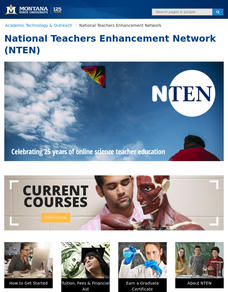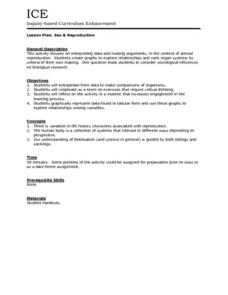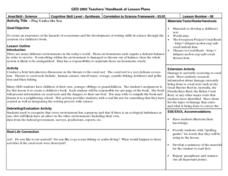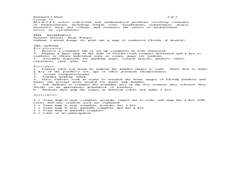Curated OER
Demonstrating Erosion in Action
Students easure and record volume of water, then measure and record mass of soil. They explain the effects of the following in controlling erosion: Contouring, cover crop, strip cropping, reforestation, inter-seeding.
Curated OER
Cell Division and Differentiation
Tenth graders investigate about mitosis, meiosis, and cell differentiation and their purposes and implications in the development and functioning of multicellular organisms. Students use individual journals and a variety of hands-on...
Curated OER
Sex & Reproduction
Students examine animal reproduction by interpreting data and making arguments and then create their own graphs to explore relationships of organ systems. This instructional activity includes an individual worksheet and a reflective...
Curated OER
Are You Thirsty? The Effects of Pollution on Drinking Water
Discuss the availability of clean, plentiful water and the causes of water pollution. In groups, sixth graders discuss problem-solving methods for keeping water clean. They explore the function of water treatment plants and perform...
Curated OER
Don't Trust Your Eyes
Students brainstorm a list of possible actions that they could do to protect the water resources from pollution. They create hypotheses and conclusions by completing experiments and observing different pollutants.
Curated OER
Water Pollution Lesson Plan: Don't Trust Your Eyes
Students develop a list of actions they could perform that would protect our water resources from pollution. They formulate hypotheses, conduct experiments and draw conclusions about actual pollutants found in our water supply.
Curated OER
Water Pollution Graphing Activity
Students describe and identify the link between land use activities within a watershed and water quality. They evaluate the quality of a "water sample" ( a bag of skittles), graph their results, and form a hypothesis about the land use...
Curated OER
Water Pollution
Fifth graders examine what contaminated water looks like, and how it becomes polluted. They examine a teacher demonstration of water is not polluted but does contain rocks and other things that do need to be cleaned out before drinking...
Curated OER
What Are We?
Students describe different types of water pollutants. They complete experiments in which they observe the affects of water pollution on algae. They also brainstorm and list three causes of each water pollutant.
Curated OER
Tee Time: A Lesson About Nonpoint Source Pollution
Students assume assigned roles as citizens in a town meeting where wealthy investors have persuaded the city government to clear an area of town to build a golf course. They are to investigate their roles and prepare a speech in support...
Curated OER
Wetland Ecosystem Conservation
Students read articles about wetland ecosystem conservation in Florida and other countries. They summarize information found in the articles. Students reflect on the information in the articles and write their feelings.
Curated OER
Erosion
Fifth graders study the effects of running water on erosion. They examine how the soil on the playground is affected by erosion and determine how the placement of trees and shrubs changes the path of erosion. In their science journals,...
Curated OER
Clean Kansas Water
Students gain an understanding of ways we can be responsible custodians of our water supply. Students explore the governor's clean water initiative involving the Lower Kansas/Republican river basin and the pollutants present there.
Curated OER
Noah's Ark, Revisited
Fourth graders do a visual presentation for a specific endangered species.
Curated OER
Sexy Coral Reef and I Want My Own Space
Fifth graders explore how coral polyps increase the chances of egg and sperm meeting after being released into the vast ocean waters.
Curated OER
Play Under the Sea
Students explore the hazards of ecosystems and utilize their writing skills to create a studenT book. Threats to the ecosystem of the coral reef are discussed and used as a model for the research of the group.
Curated OER
Archaeobotany
Students study pictures of seeds and the conditions in which they grow during their study of archaeobotany. They infer ancient plant use by looking at archaeobotanical samples. They determine the change of plant use by interpreting a...
Curated OER
What's The Flow?
Students examine urban runoff and identify peak flows. They examine causes for different flow rates, and complete worksheets and a graph.
Curated OER
Connections
Students examine the interdependence of the West Central African forest ecosystem. They draw pictures of items found in this ecosystem, discuss their interdependence, and answer discussion questions.
Curated OER
Listening to the Prairie
Students, in groups, visit an exhibit and for a prairie scavenger hunt to locate sunflowers and name products made from them. After sketching a prairie dog, they find nature cues farmers use when growing plants and raising animals. The...
Curated OER
The Compost Bucket
Students recognize that plants and soils have a close relationship. They view a photo essay on the common practice and natural process of composting. Afterwards, they observe the process of plant decay over the course of several days.
Curated OER
Home on the Range
Young scholars use maps and mathematics to determine the appropriate panther population in a given area. In this Florida ecology lesson, students research the area requirements of male and female panther and use a map to help calculate...
Curated OER
Are You Thirsty: The Effects of Pollution on Drinking Water
Students discuss the different causes of water pollution. In this ecology lesson, students brainstorm ways to purify polluted water. They formulate their conclusion based on the results of the experiments.
























